In his first interview to The Indian Express since the abrogation of the special status of Jammu & Kashmir and his release from detention, Omar Abdullah, Vice President, Jammu and Kashmir National Conference, and former Chief Minister of erstwhile state of J&K, speaks about a range of issues from the Gupkar Declaration on August 4, 2019, to a sense of “disappointment” by the reaction of India’s political leaders post August 5, 2019, and the future of mainstream political parties in J&K.
It’s almost a year since August 5. This time, last year, did you have an idea of what was coming?
Last year, this time we were trying to figure out what was coming. Everyone would speak to everybody else: Aapne kya suna? Kya ho raha hai? Kya lagta hai, kya karenge? That was all we were discussing. Because those orders had started coming, about Railways — we foresee a prolonged disturbance, we had heard that satellite phones were being ordered… one didn’t know what to take as truth and what to take as the usual sort of speculation and rumour-mongering.
Like I said, there was speculation that the gender issue in 35A would be tackled. That some aspects of Article 370 would be downgraded. Two days before all this happened, we had one last meeting in the party office…by then disinformation had been conveyed that there’s a serious threat to the (Amarnath) yatra and that completely misleading, untruthful bit of news they planted everywhere, to get all the yatris and the tourists out.
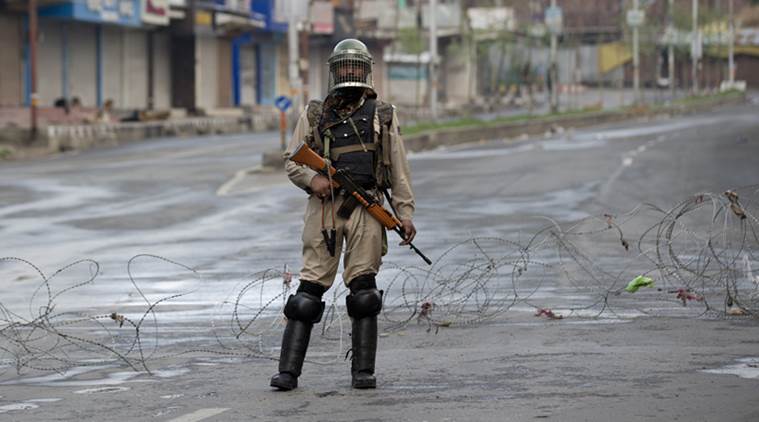 A soldier stands guard on a Srinagar road under curfew on August 7, 2019. (Photo: AP)
A soldier stands guard on a Srinagar road under curfew on August 7, 2019. (Photo: AP)
So, of course, we were trying to understand whether there was an element of truth to that. We were all like: OK, maybe it’s 35A, maybe it’s 370 and there’s one colleague of mine, (who for the time being will remain unnamed) who said: Nahin inko sab kuch karna hai. Ye 370, 35A hatayenge, ye UT bhi banayenge aur ye riyasat ko todenge bhi.
Humne kaha ki itna toh nahin karenge. We all thought they wouldn’t go this far… And then, on August 5, when I switched on the TV and I heard it all rolling out and, one by one, each of these things happened, I said, bloody hell, you were the only guy in the meeting who actually, he had nothing to base it on, just his premonition that it will all happen. Lo and behold it did. That’s exactly how it played out unfortunately.
Can you give us a prelude to the Gupkar Declaration?
There was no prelude to it. We were trying to pre-empt it. There was this need that was felt for a meeting of like-minded political parties occupying the mainstream space. It was felt that meeting should be called by my father. But he, actually, was going through a pretty bad bout of health…bit of problem with his heart. So weren’t able to, for those few days, but then after he came back from Delhi and this was on the evening of August 4. In the morning, Mehbooba Mufti sahiba called a meeting and then Dad spoke to her and said look that’s fine if the meeting goes ahead. After the meeting, since I can’t leave the house, if you would come here, then we can continue the meeting here. And that’s pretty much how it played out. Of course, nobody knew that was going to be the last time we would be sitting in one place.
So there was no sort of prior preparation for it. It’s not like we had an agreed text before the meeting. It was during the meeting while everybody was speaking, it was felt that there needed to be a common statement and I don’t remember who it was, but somebody said that it needs a name.
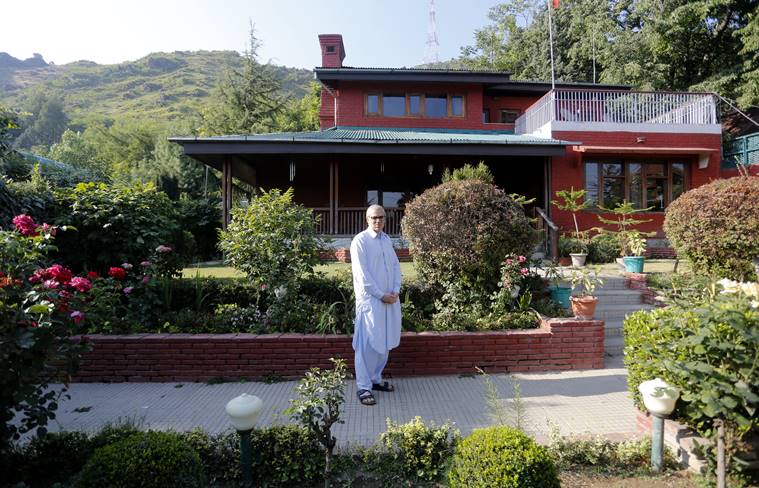 Abdullah at his home in Srinagar’s Gupkar Road. (Express photo: Shuaib Masoodi)
Abdullah at his home in Srinagar’s Gupkar Road. (Express photo: Shuaib Masoodi)
Since Gupkar Road was where we were all meeting, that seems to be the standard pattern, so it became the Gupkar Declaration. That’s pretty much how it came about. And then that night we were all detained in our own respective places of residence and some of us were shipped off to other places.
Looking back, could you have rallied harder or done more pre-August 5?
No, because this government had made up its mind way back in April. We only started hearing speculation in July but I have it on very good authority from officers in the J&K administration that some of them were sounded out as early as May, that the Article 370 move is in the offing. It’s not like we didn’t try and raise those concerns at various levels. And when the Governor of J&K, sitting in Raj Bhawan can lie to people, in the blatant manner that he did, then what’s left. We, rightly or wrongly, took him at face value and I still have screenshots of his interviews to television where he says there’s no threat to Article 370, go about your normal business.
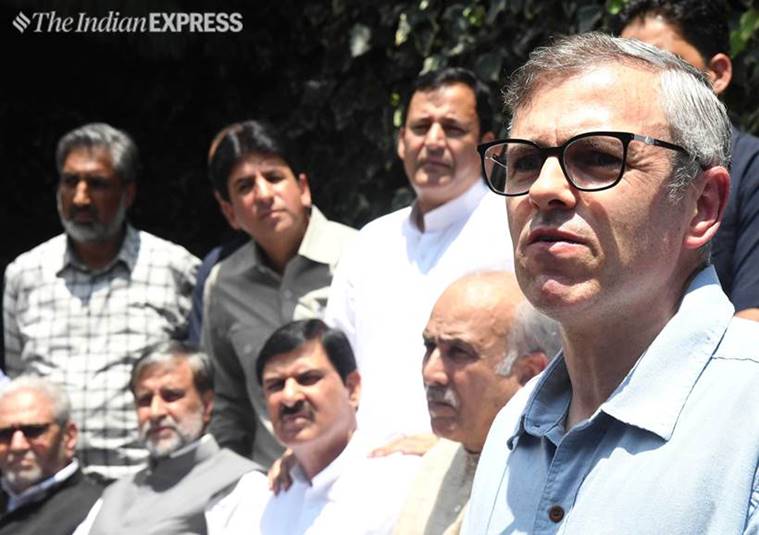 The National Conference delegation that met Governor Satya Pal Malik on August 3, 2019, to apprise him of the “panic” in the then state. (Express Photo: Shuaib Masoodi)
The National Conference delegation that met Governor Satya Pal Malik on August 3, 2019, to apprise him of the “panic” in the then state. (Express Photo: Shuaib Masoodi)
Now, either he had no idea what was coming, which I don’t believe. Or then, he happily went along and sat in that high office and lied to people. The government had made up its mind that this is what they were going to do. So as much as I’d like to believe that we could have done something about it, honestly, truth be told, No.
After you were released, why would you not want to step out, meet with people, party leaders?
That was always going to be the idea. During my period of detention, I was always clear that once we were out, it would be important for the party to sit down, take stock of where we are and then chart out our own course of action. Two things came in the way of that; one, the day I was released, that night itself we had the first phase of the Covid lockdown. And, second, most of the my colleagues weren’t free to meet and, in fact, a lot of them are still under detention, illegally. We are fighting their detention now in J&K High Court.
So these are leaders under the so-called house arrest?
Yes, basically you sit at home and your guards at the gate are told that you are not allowed out. So there’s no formal detention order and so when the government goes to the High Court we haven’t arrested them, technically the government is not lying to court because, there are no formal detention orders. But the police at the gate and the local thana, are told that these chaps are not allowed out.
You’re not allowed out of your house. One colleague of mine needed a medical check-up. He said that he would use his own car to go and he was told categorically that we will send you a vehicle, you will travel in it. The vehicle will take you only to your medical check-up and bring you back home. You will not stop anywhere else, you will not visit anybody. And that’s it. There is no formal detention order against this person. He has been sitting in his house since August 5 and this was the first time he went out, in a police escort. That is illegal detention.
Does that stop you from going to the houses of party functionaries? Do they stop you from going to your colleagues’ houses?
No, in most cases they don’t. I have met some of them, some I haven’t because either I don’t want to put my father at risk of the Coronavirus or I don’t want to risk them. So that’s another reason. Some of them are not detained in Srinagar, they are detained out.
See, that’s part of the cleverness. You allow people in, but you don’t allow these people out. Personal liberty means I should be able to leave my house when I want to. Not just about people visiting me. It’s about my choice to leave when I want to, which has been taken away from them.
At several places people told us they are waiting for Omar to speak. Some said there is no person to rally or no person to provide leadership…
We are voicing our resentment. I haven’t so far, for two or three different reasons. The first being that when I came out, as I said, Corona was the one thing everybody was talking about. Well, first of all, we all bought this argument or this line that a couple of weeks of lockdown and the threat of corona will dissipate. So I assumed that it will be a few weeks and that will be it. And that two weeks has now stretched to where we are now.
Second was, that knowing that I had colleagues under detention. Some under formal PSA (Public Safety Act) and some under informal detention, I didn’t want to say or do anything that would jeopardise their liberty. Because we kept being told, bas ab aap nikal gaye ho, ab inki bari hai. Just a few days and they’ll be out. Those few days kept stretching. Finally, as I said, we decided that we are not going to wait for them to be released on their own, we will have to force the issue.
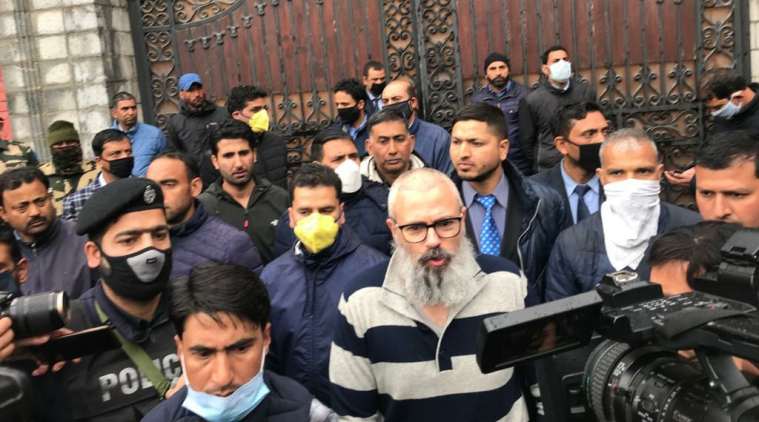 Abdullah outside his residence in Srinagar after he was released from detention in March. (Express Photo: Naveed Iqbal)
Abdullah outside his residence in Srinagar after he was released from detention in March. (Express Photo: Naveed Iqbal)
That’s the only way to get out. If you don’t force the issue, you don’t. That’s how Sagar sahab (NC general secretary Ali Mohammad Sagar) got out, that’s how I did and that’s how these colleagues of mine will finally get out.
If you don’t force the government’s hand, they’re quite happy to leave you sitting in detention for as long as they require.
Would you say that people are right to be disappointed in waiting for you to speak up on their behalf?
Well, I can understand where that disappointment comes from though as I said, I had very good reasons not to speak. These are the same people who, in the beginning, appreciated that during this Corona pandemic, I wasn’t indulging in politics.
And that pandemic, if anything has gotten worse. So truth be told, I could very easily continue to take that line. But I believe that we can’t wait for this situation to pass before we speak up which is why…and also, I think we needed some sort of occasion around which, to speak.
Either it would have been our party meeting which is, ideally, where this would have come from. The National Conference would have met. Even now, when I speak to you, I speak to you as an individual. I am not speaking to you as the Vice President of the National Conference espousing what the NC’s view is. Because the NC has not had an opportunity to sit down and tell you what it wants.
When I tell you that I, as an individual, that I will not be fighting assembly elections, so long as J&K is a UT, it is Omar Abdullah. That’s not the National Conference.
Your colleague and the party’s chief spokesperson, Aga Ruhulla, has clearly said that the party probably needs to meet to chart its future course. But what stops that party from talking about its agenda?
We are talking about our agenda. The NC has also not hidden its agenda. We made our agenda very clear in the immediate aftermath of August when we went to the Supreme Court and we said that these changes to J&K are unacceptable to us. That we will fight them with every democratic means at our disposal. We stand by that.
So unlike other parties that may say something in the public sphere but have not mounted a legal challenge to what has happened, we are. Now if you are asking me whether the NC will take this battle to the streets, I think the time for that has passed. When in the immediate aftermath of what happened on August 5, the battle didn’t go out into the streets, why would it go down to the streets one year later. So we will fight it politically, legally. We are committed to do that.
We make no bones about the fact that everything that has been linked to what happened on August 5, we have voiced our opposition to, and we have resisted. Whether it be the domicile law or the delimitation commission. NC’s members of Parliament have refused to participate in the delimitation commission because we don’t accept what was done on August 5. So we are not shying away. What you haven’t heard is individual interviews from let’s say, myself or Farooq Sahab or may be one or two others. But that’s simply because, like I told you, and that has changed. That has changed with Dr Sahab’s interview to PTI and this, my first interview with all of you. And this will continue now.
At the same time, Government of India, without caring for the pandemic . .
That’s another reason. When others don’t stop their politics then why should we? If the BJP can continue to do politics and if Apni Party can do politics, then I guess, the NC also needs to say what it has to, which we are doing.
What makes you say that the time for protests on the streets has passed? The sense one gets from speaking to people in different parts of Kashmir is, of course, a sense of loss…they also say that leaders haven’t been there.
I’m sorry but that’s a very convenient way of passing the buck. You didn’t need leaders for a 2016 agitation, it was a leaderless one. All the protests after that, that you’ve had in J&K, they were leaderless protests. So don’t tell me today that you need a leader for a protest. Most protests are spontaneous, they’re not engineered. And a year later, if you want to see a protest, it would have to be engineered, and I am not the person to engineer a protest. I’m sorry, that is not me. It has never been me. It is not my politics, it is not my party’s politics.
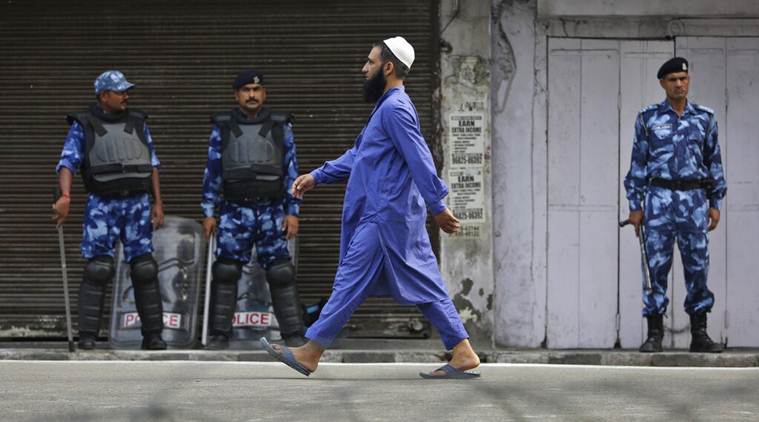 A man walks past soldiers after offering Eid al-Adha prayers on August 12, 2019. (Photo: AP Photo)
A man walks past soldiers after offering Eid al-Adha prayers on August 12, 2019. (Photo: AP Photo)
I will not engineer a protest to score a point. I will use whatever other means I have at my disposal. I will use my voice, my party platform, the courts and whatever else I can use but I will not engineer a protest. Particularly in Kashmir, where I know that an engineered protest will in all likelihood end very badly for poor youngsters who will get sucked into it.
I’ve said this before, if I am not willing to put a stone or a gun into my own kids’ hands, I have no business doing the same to any young Kashmiri. I am very clear on that.
So if the people of Jammu and Kashmir, are looking towards me as some sort of person who will rally them out into the streets and god forbid get some of them killed, then I am not that person, I will not do that. I will raise my voice against what has happened. I will fight against what has happened but I will not give somebody wearing a uniform with a gun an excuse or a reason to kill one of us. That’s not me.
So what explains this silence on the street?
I don’t know. I honestly, truly don’t know. Other than, in this case, may be it’s just protest fatigue. Just the fact that you’ve had protests that have resulted in deaths in triple figures in the past, that changed very little on the ground. Maybe this time people decided that they weren’t going to come out and give the security forces an excuse or a reason to use force and that’s why the protests involved shops being shut, kids not going to school, transport staying off the roads.
It didn’t involve stones being thrown and things like that. Which is not to say that the anger isn’t there. If the anger wasn’t there you wouldn’t see youngsters lining up to join militant organisations, sadly they are.
The fact is, talk to anybody in South or even North Kashmir, youngsters are willing, weapons are unavailable. So this whole bogey that was sold to the nation. The abrogation of Article 370, will end separatism and will end militancy in Kashmir is far from the truth. The same government of India is today telling the Supreme Court that we need to continue the ban on 4G because violence in Kashmir. When violence is going up it shows that abrogation of Article 370 has not done anything to lessen the anger. In fac,t if anything, it has increased the anger.
But if you were to ask me why is it that immediately after August 5, you didn’t see the kind of protests that perhaps had been anticipated or feared, other than my own assessment that it’s protest fatigue, I don’t know if there’s another reason. Locking up mainstream leaders can’t be the reason because mainstream leaders haven’t been the ones to try and propagate street protests. So you can’t say that because I or Mehbooba or other leaders were detained, that’s why the protests didn’t happen because, we’ve never been the ones to tell youngsters to go out into the streets and protest.
Do you think the unprecedented clampdown explains the fatigue?
Could be. I wasn’t out at that time and I was completely disconnected from what was happening in the country. It was five weeks before I got a newspaper. Or before I saw a news channel. So for the first five weeks of my detention I really had no idea what was happening in the rest of the Valley or the rest of the country, other than a little bit of hearsay. To give you a small example, it was actually days later that I heard that Arun Jaitley had died. So, that’s how disconnected we were from what was happening in the rest of the Valley.
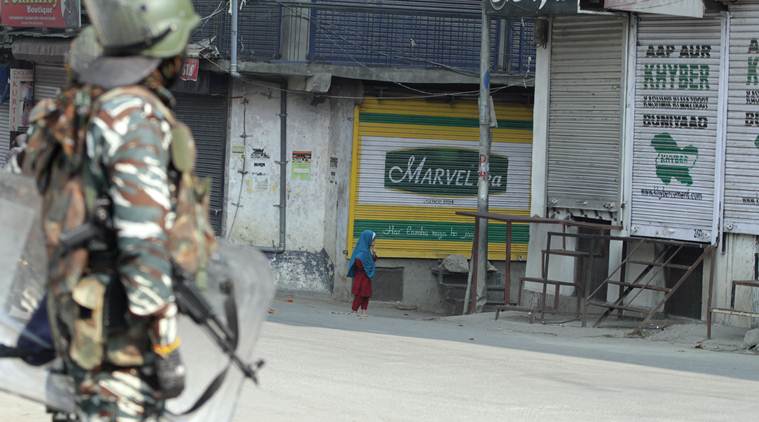 Post abrogation of Article 370, protests in Kashmir have involved shops being shut, kids not going to school, transport staying off the roads. (Express photo: Shuaib Masoodi)
Post abrogation of Article 370, protests in Kashmir have involved shops being shut, kids not going to school, transport staying off the roads. (Express photo: Shuaib Masoodi)
One did hear drones flying around and I did see the helicopter activity on August 15 so we knew that there was a larger than usual presence of security forces. Was that clampdown the reason? Look, you know what people are like here. The presence of security forces in itself is not a deterrent to protest, if you want to come out and we saw that in 2008, 2010, 2016…so that can’t be the only reason but yes it may have been a contributing factor.
It still hasn’t sunk in. Honestly, if you were to ask me am I now reconciled to what has happened, am I less angry less bitter, then no. I know it’s happened and I’m no longer living in denial. I don’t think this is some dream that I’m going to wake up from. But it’s not an idea that I’m now comfortable with.
What were you doing on August 5?
For the first part of August 5, I was locked up at home. I was one of those illegal detainees. In the morning, I went around my house and checked the gates and saw big padlocks on them and the security people told me that I had been told to stay at home. Theek hai.
And then in the evening, I was in the house and my chap came and told me aapko lene aaye hain, they’ve come to take you. So I said who? and he looked really white. So he said they’ve come to take you away and they’re probably taking you to some guest house. So I said accha chalo not to worry. I came to the verandah here, and there was a cop and somebody from the Srinagar civil administration and they gave me this piece of paper and they said, you are being detained, you have to go to Hari Niwas.
So I said chalo theek hai. Give me some time to shower and pack and I’ll be ready. Foolishly at that point, one assumed that couple of weeks, August 15/August 16 will go. Once that passes peacefully, they have no reason to keep us. I had no idea how long this was going to last. Like I said, I had anticipated that this will be a matter of weeks. So I packed accordingly.
Then I asked if I could say bye to my dad. The family was sitting in the garden and so I went and told them I am being shipped off and so I’ll see you guys when I see you. And they were like have dinner and go. I said look, I am not a guest of the government, I can’t now sit with you guys and have dinner ab jo hoga wahin pe hoga. This was just around sunset – about 6, 6:30 in the evening. So I went to Hari Niwas and the staff very kindly were putting me in this very nice big room with a view of the lake and the magistrates looked at the detention order and the room name and said, “Ye kaunsa kamra hai?” They have names, that, too, I think was called Kokernag. So they said, “nahin, inke order mein Verinag likha hai, inko Verinag le jao.” So I said fine. Verinag was a room at the back, which didn’t have much of a view. So I set up my stuff there. And then I was told that Mehbooba was in the same building.
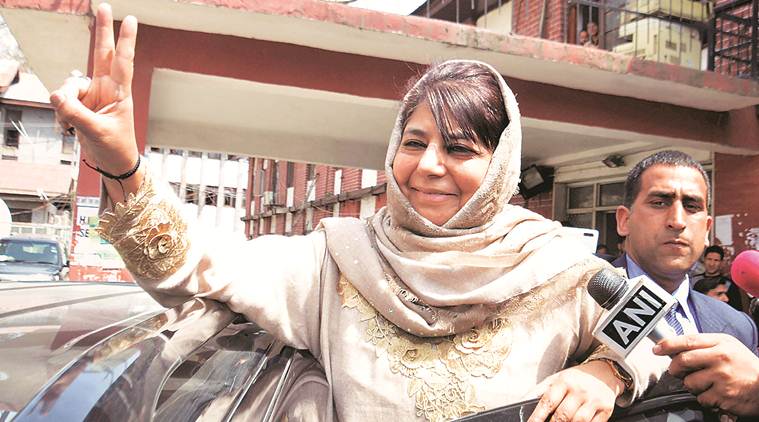 Abdullah said he and Mehbooba Mufti were briefly detained together at Hari Niwas, but now allowed to meet. (PTI /file)
Abdullah said he and Mehbooba Mufti were briefly detained together at Hari Niwas, but now allowed to meet. (PTI /file)
The only instructions that I got were that you’re not to cross paths with her. That was made explicitly clear. I said look at the best of times we have no interactions. So it’s not like we are such great friends that we are going to look for each other.
Through the security people I arranged that look — we both would like to use the grounds so, I’ll take the morning, you take the evening, and that’s safer. So for the first 48 hours or so that she was there, I would walk in the morning and around sunset she would come. And then one day, there was this massive activity and I was told that she’s been shipped off.
I later came to know that this story had been planted that we had a bad fight and she had been shipped out for that and that is such complete lies. She and I never met, much less fought. So whatever other reason they may have had for moving her, our interaction was not that.
But then this is not the first lie that was planted in newspapers after August 5 and that’s just the way it was. It kept getting extended. Eid became 15th August, then there was something about September. Then it became accha when it actually transitions to a UT then there they release you, finally we lost patience. And then it became six months of (detention under sections) 105/107 then they let you go.
Honestly, in my wildest dreams I didn’t think they would put PSA on us. Then when PSA happened then I said look enough is enough I’m going to court. I’m not going to wait.
So what were you doing these six months?
I was reading, I was walking. After five weeks they put a set top box so I was able to catch up with the rest of the world. Thankfully, they didn’t mess with the channels. Most of the news I got from BBC and Al Jazeera. Newspapers started after the fifth week, and local.
Have you been speaking to Farooq Sahab about this?
This is not an easy subject for him to talk about either. Because, I guess with all of us, there’s a great sense of personal betrayal. This was not what J&K signed up for. This is not what parties like mine and other mainstream parties stayed with the mainstream for. We didn’t lose the number of lives that we did for this to happen. India, as a country, promised Jammu and Kashmir something and went back on that promise. There’s a deep sense of betrayal that comes with that.
What is your biggest fear?
What’s left to fear. I take some solace from the fact some of the changes that have been made can be undone. Without getting into details now, because that is a post Assembly, post restoration of statehood scenario.
When you say statehood, do you include Ladakh?
Getting Ladakh back? I don’t want to force somebody to be a part of us that doesn’t want to be. Ladakh is different from Kargil. So if Ladakh wants to stay, by all means. Who’s going to twist your arm and keep you? By that same extension of logic, you shouldn’t force Kargil to be separate when they don’t want to be. That’s not within the power of J&K even with statehood restored, to be able to undo. I’m not even getting into that argument.
Do I fear this whole thing about demographic change and altering the character of J&K as a Muslim majority state? I don’t think it’s something that we should ignore but it’s not something that’s going to change immediately. I think it’s also less of a threat to Kashmir than it is to Jammu. Which is why today you find Jammu more agitated about domicile than Kashmir. Part of me takes a great degree of satisfaction, in part perverse satisfaction from seeing the people in Leh so agitated about domicile. Because they were so happy to celebrate the end of 370 and 35A and now they’re screaming for the same protections.
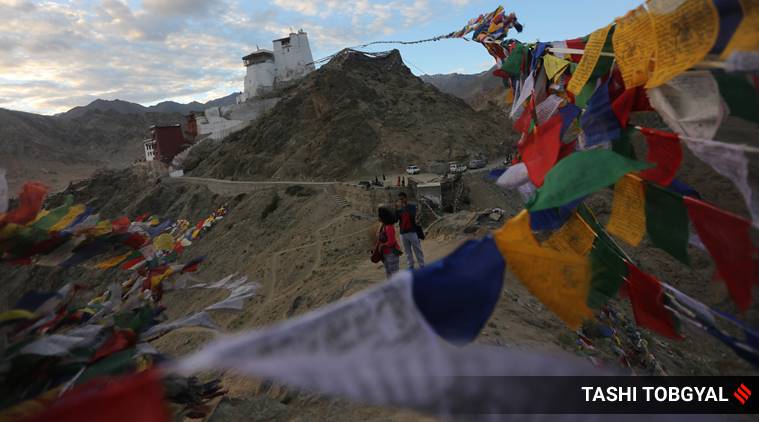 About Ladkah, Abdullah said ‘I don’t want to force somebody to be a part of us that doesn’t want to be.’
About Ladkah, Abdullah said ‘I don’t want to force somebody to be a part of us that doesn’t want to be.’
We warned them, that look, before they come to Kashmir, they’ll come to where you are. But at that time they were riding high, they thought that they’d gained everything. It’s only now that they’re beginning to realise the threat that they face. So, yes it is something that we need to keep an eye on but it’s not going to change drastically, I believe, in at least our lifetime.
How do you react to other national parties, their voices post August 5? What were your expectations?
Again, such a great degree of disappointment. At both: first, the way in which they reacted to what was happening to J&K and I’ll draw the distinction between 370 and dismemberment and UT development. Because I understand that the BJP had raised 370 and 35A to such a fever pitch that it would be very difficult for a political party in the rest of India to take a stand against what the BJP was doing. Because I don’t think they understood the issue well enough. I don’t think they had gone into the detail of the history of why 370. Why did it come about, how did it come about? How long did it take and all that was involved in it.
It became this whole thing about, Jammu and Kashmir has to be brought on par with the rest of the country. Why should one country have two systems? So, I’m less resentful of their support to BJP on 35A and 370 but I’m deeply resentful about their support on the UT and the dismemberment, because they did not need to support the BJP on that. It was never part of the BJP’s agenda. It was done purely to punish J&K. To punish the people to humiliate them, there was no other reason for it.
And to see parties that have been fighting for their own cause, take the Aam Aadmi party for one. Every day you have Arvind Kejriwal fighting, well at least until recently, now he seems to be very cosy with BJP. But otherwise, until recently you had Arvind Kejriwal fighting pitched battles against the Lieutenant Governor and asking for Delhi to be given full statehood and here he happily supports J&K being reduced from a state to a UT.
You have parties like TRS, that fought for statehood and happily supported (the BJP) while a state was reduced to a UT. So these are not things that are easy to swallow. You have Chandrababu Naidu’s party. My father left his own Parliament election to go and campaign for CBN knowing full well that it was a losing battle. That Jagan Mohan Reddy was going to wipe the floor. Except for maybe CBN, everybody else knew that the guy was going to have everything taken away from them. And even then my father left his own Parliament election and went to campaign for him. And that man couldn’t utter one word in support.
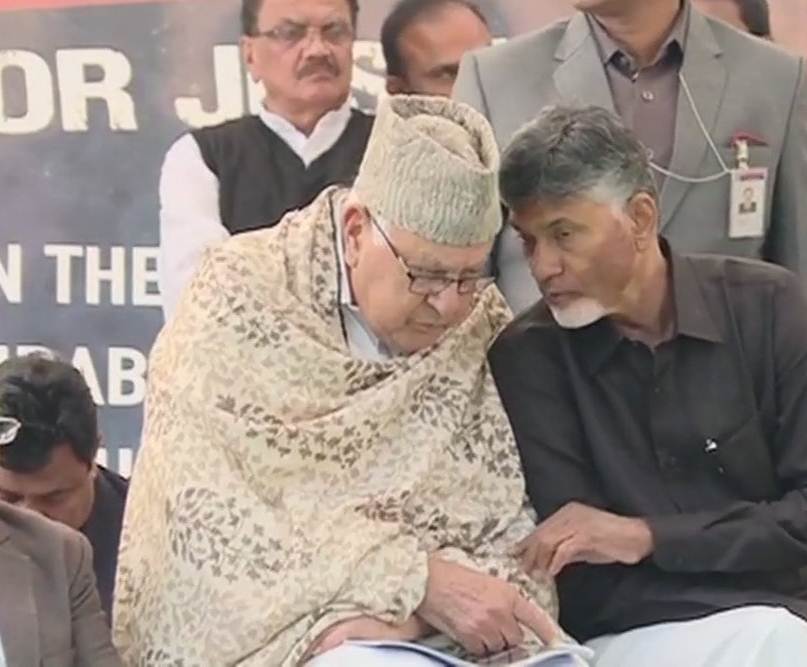 Farooq Abdullah with Chandrababu Naidu in February 2019, when the latter was sitting on a dharna at Andhra Pradesh Bhawan, demanding special category status for his state. (File)
Farooq Abdullah with Chandrababu Naidu in February 2019, when the latter was sitting on a dharna at Andhra Pradesh Bhawan, demanding special category status for his state. (File)
That’s the way J&K was handled. And then the way the detentions were handled. Token lip service. Hardly an effort was made to come here. Just because Government of India said we won’t allow you in, you go back from the airport as if your job is done. We kept looking in the papers and through people whether anything was being said on social media. Is there anything coming out about what’s happening in J&K. About the detentions, about the lockdown. About the way in which personal liberty is being snatched from people.
Hardly anything. Parliament, may be one odd speech, otherwise nothing. It was, for the first time perhaps, politically I felt that we were absolutely alone. That all these friendships that we talked about and these grand alliances and all, they all stopped the other side of the Pir Panjal. They didn’t extend this way.
They were happy to take our support when they needed it for their own causes but they didn’t find common cause with us and, honestly, I will not stand up for a single one of them tomorrow. Not one of them. I won’t campaign for any of them, I won’t support any of them and god forbid any of them get taken off to jail, I will not utter a word for them, because they didn’t speak when people here were suffering.
When Kashmiri kids weren’t able to go to school. When our traders weren’t able to open their shops. When tourists were being railroaded out of here overnight in buses and hotels were being emptied. When jails were being filled with people for no reason. These people lost their voices. God forbid, anything like this happens to them, I will lose my voice as well. I have no cause with them. That’s it. I will speak for the people of J&K, I don’t speak for anybody else.
How do you see the future of mainstream politics in Kashmir?
This is a question I do not have an answer to. I don’t know how much political space today actually exists for mainstream political parties. It’s something that I have been asking myself and deliberating over since August 5. I don’t know where mainstream parties stand today and New Delhi is responsible for that.
Mainstream political parties were the bridge between J&K and the rest of the country. We put our lives on the line to keep that link alive. We went against sentiment — how large those quarters were is open to debate – but you can’t deny that there are elements of separatist sentiment in Kashmir. Only a fool will say that there isn’t. So we went against those sentiments, we went against boycott calls for elections. We tried to rally people to come out and vote and then we find that the very thing is used against us in our PSA detentions.
Please understand where we come from. New Delhi’s actions reduced us to elements of ridicule. I’m not a fool that I’m living in denial that Kashmiris, and all Kashmiris were deeply distressed by my detention, they weren’t.
I will honestly tell you that there were enough Kashmiris that were happy to see us detained. Who said — accha hua inke saath. Who turned around and said this is what Farooq Abdullah gets for saying Bharat Mata ki Jai. Serve him right. Keep him as long as you like. This is what you get for contesting elections. This is what you get for putting down protests in 2010/2016. Keep them in as long as you like, we don’t want to see them out. There were people in the valley who felt this way and still feel this way.
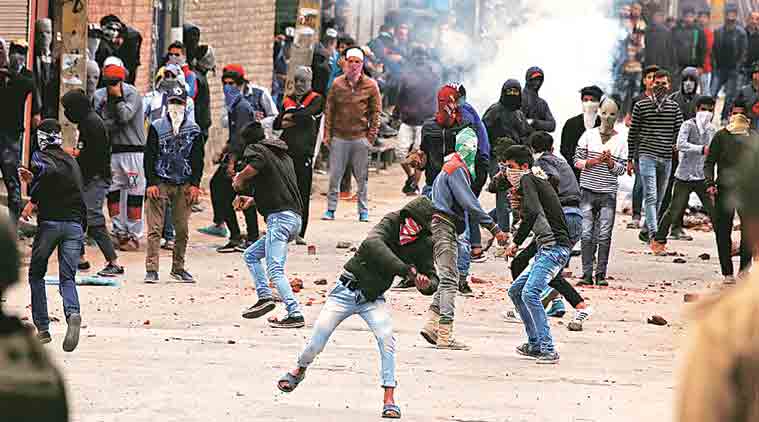 Abdullah said he took the “police line” to curb protests “not out of expediency, but out of a sense of belief.” (File)
Abdullah said he took the “police line” to curb protests “not out of expediency, but out of a sense of belief.” (File)
I honestly took the police line, I did as part of the mainstream, not out of expediency, because it’s not an easy one to take. But out of a sense of belief. You took that belief and you trampled on it. And that’s, how does one tell you how betrayed one feels. When you take a stand, you expect one side or the other to be happy with what you say. Imagine our plight; we are are not Kashmiri enough for a lot of Kashmiris, who see our political stand as a betrayal and strangely, we are not Indian enough also. So then where do we fit?
That’s why when you say, where does mainstream fit, I don’t know where mainstream fits today. I keep trying to ask my colleagues, when they come and tell me ki sab kuch accha hai, sab aapke liye wait kar rahe hain. . . Kaun wait kar raha hai? Jalsa humne kiya nahin, programme hamare hue nahin. How do I know, that where yesterday I had 10,000 people ready to hear from me, will I have a thousand tomorrow ready to listen or not, I don’t know. I really don’t know how much of a setback 5th of August has been to mainstream politics in Kashmir.
Now if mainstream means some Government of India invented party, wo toh theek hai, that you can do. But if mainstream is National Conference, PDP, Congress and others, I don’t know what space there is.
For decades, National Conference politics has revolved around autonomy. With the changes in effect now, are you going to change slogans?
Look, I can’t speak for the party but I will not support a slogan that is mere lip-service or hoodwinking. I think we need to be honest with people, even if it means that in the short term we will be less attractive to people than we would like to be. But what the National Conference wants to take to the people is something only the National Conference can decide. I can give my views in that meeting but I can’t speak for it now. I will admit this much that finding a political plank at this point is not going to be the easiest thing. But it’s a challenge and we will have to rise to the occasion.
Do you see any common cause with separatists? Because you have been reduced to the level of separatists?
No. We haven’t reduced ourselves, Delhi tried to reduce us to that level. Delhi tried its damnedest to equate us with separatists, but we are not. One thing I was very clear on, even in detention, I am not going to come out from that place espousing a political line that I don’t believe in, because it might be popular or it might be favourable at the time.
At the end of the day if I am not true to myself then how can I be true to people. I have to let the people know who I am and what I stand for and then it is for the people to decide whether they like me or not. In detention it’s not like I didn’t toy with the idea of leaving politics as a whole. It was perhaps one of the most challenging conversations I had with myself. But then, I also don’t want to walk away today and leave the ground for those people who have actually been responsible for what J&K went through on August 5. Which is not to say one day I won’t walk away, just not now.
So when you say we’re not Kashmiri enough here and not accepted by nationalist sections in India, do you mean the party as a whole or just yourself?
I guess it’s difficult to separate the two because my politics is the NC’s politics. One thing is very clear, that the National Conference is a mainstream political outfit. That’s not changing. How opportunistic of us would it be if suddenly the National Conference were to adopt the garb of separatism. Who will buy it? Even the people who are deeply committed to the cause of separatism will not own you tomorrow. So let’s be true to ourselves. I think that we owe it to the people to be honest with them about what we can and can’t achieve for them. And that would be the main input and advice I would give the party in the meeting that we have.
The NC is not going to change its political outlook. We haven’t done it in 30 years of militancy, we’re not going to do it now. The political landscape is not an easy one to operate in but we will figure it out.
The party will go through the democratic process of elections?
That is for the party to decide. My own individual view is that, look there are only two types of political parties here. You’re either a separatist party or you’re a mainstream party.
You cannot be a mainstream party that doesn’t participate in a democratic process. And you can’t be a separatist party that participates in it. Because there have been variations on this and they’ve made a complete hash of things. So let’s accept that the NC is a mainstream political party and we attach score and we believe in the democratic processes. And that’s the way it is.
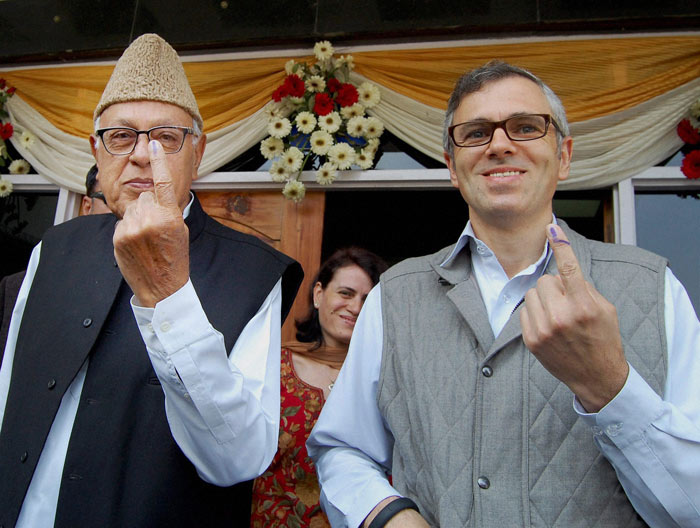 Farooq and Omar Abdullah during the 2014 Parliamentary elections. (Photo: PTI)
Farooq and Omar Abdullah during the 2014 Parliamentary elections. (Photo: PTI)
For those democratic processes to work. We will have to ensure that we make space for ourselves in the hearts and minds of people. And that brings me back to the previous point as to what we will do to make that space, I don’t know today, but it’s something we have to do.
Other than being honest with the people and telling them that look, we are fighting against everything that was done on the August 5. We will continue to fight against it, but we will not use undemocratic means to do so. That we will not — I said this earlier — if the people of Jammu and Kashmir are looking towards me as the person who will rally them out of their houses and god forbid get some of them killed then, I would rather they tell me, because then I will pack my bag and baggage and go.
I do not believe that that is the leader Kashmir needs but that is also not the leader I will be. If that’s the leader they want, then they need to look towards somebody else because I will not sit in this cushy environment with all this security and tell people to die on the roads. That’s not me.
Do you think as and when political activity in the UT starts, would you get to the level of panchayats and such?
That’s still far. You have what they called a very successful Panchayat election which is largely incomplete. We all know most people weren’t able to write or report about it and had to waah waah the government for this great job they’ve done. But we all know what a terrible job these Panchayat and local body elections were. Assembly elections aren’t even on the radar, at the moment. You need to go through this entire process of delimitation and see what impact that has on the political landscape of J&K. Then we will get into this whole debate about what activities . . . that’s looking much further ahead.
At the moment, you have a disempowered assembly. Which is again, why I said — look I have been the leader of J&K state’s assembly, I am not going to J&K UT assembly and act as if nothing has changed. So long as J&K remains a UT, I will never be a member of its Assembly. Hopefully, when J&K is restored to statehood then we can start taking a look at everything that has been done and see what options are available to us.
This whole argument that was floated that J&K’s special status needs to be removed because J&K has to brought at par with the rest of the country. If that be true than why are you treating us separately.
In every way where it suits them, we are treated differently. Take the delimitation commission for one, why is it that J&K has been singled out amongst the states, other than a handful in the North East, only J&K has been singled out for delimitation. In spite of the fact that we went along with the rest of the country and passed, by two-thirds majority, the necessary bill in the assembly to put delimitation on hold until 2026. If the idea was to bring J&K at par with the rest of the country, then our delimitation should’ve happened in 2026.
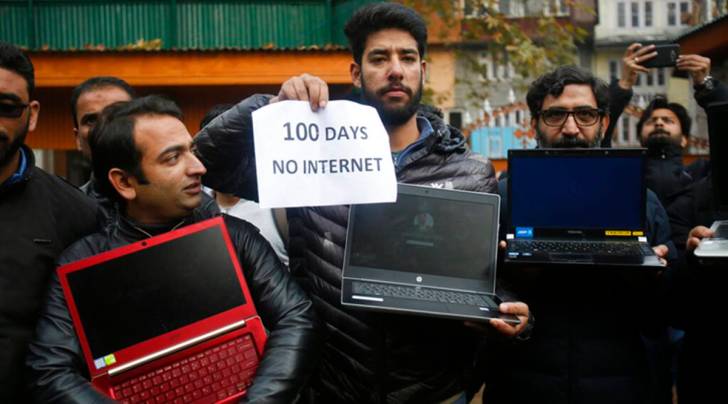 Kashmiri journalists protest against 100 days of internet blockade in Srinagar on November 12, 2019. (Photo: AP)
Kashmiri journalists protest against 100 days of internet blockade in Srinagar on November 12, 2019. (Photo: AP)
The Public Safety Act, why was this act retained in your statute books? It doesn’t exist anywhere else in the country. So for convenience sake you retain PSA and then you say we are binging J&K at par with the rest of the country. The rest of the country has 4G, we have no 4G. You say 4G has been taken away because of terrorism, in the same breath you say Pakistan is responsible for terrorism. If Pakistan is responsible for terrorism, go punish Pakistan, why are you punishing us?
If (Article) 370 removal has removed alienation, sectarianism and all these other isms, then what is the justification for depriving us of 4G internet connectivity. So when it suits you, the argument is we have to bring you at par, yet when it suits you, you do everything to treat us differently. You cherry-pick your arguments to suit you. Two UTs were carved out on August 5, why is it only one has a domicile law and the other doesn’t. Why don’t you give the same domicile law for Ladakh that you gave here and see what happens there?
Okay, at least give us a domicile law that is as strong as the one in Himachal. I studied in Himachal, I did my 10th and 12th there, I’m not entitled to domicile. Yet in Jammu and Kashmir, if you did your 10th and 12th here, you get a domicile certificate.
So you cherry pick the most convenient formation that you can bring about. Then you tell the rest of the country ye toh humne inko barabar karne ke liye kiya hai. Baraabari toh aapse hoti nahin hai. Then you wonder why we are resentful about what happened. We have every reason to be resentful and suspicious. No promise or commitment has been kept and then we’ve been lied to. We don’t trust anybody now. It’s sad but it’s true. You have taken the one thing that was so important in the relationship and that’s trust and you trampled on it. And then they think that everything is normal, sab khush hain. If that’s what you want to believe then who can disabuse you of that belief.
How are you going to fight this politically or democratically when this is UT and you won’t be the only one to rally people out into the streets?
I can only do as much. I can only tell people that look I will not be a participant in the electoral processes of a Union Territory. This whole idea that I’ve done some deal with the Government of India. Arrey bhai what deal can I do? Zyada se zyada I can get a deal to put me on the chief minister’s chair, jab main aapke assembly ko nahin maanta, main woh election ladne ke liye taiyyar nahin hun jisse ke aap mujhe UT ka chief minister banaaoge toh phir maine kya deal kiya aap logon ke saath? Main us UT ke assembly mein jaana hi nahin hai. That’s as much as I can do. I can tell the people that I will not participate in the political process of a Union Territory. That you restore our statehood, give us back what you took away from us to insult and humiliate us like this reducing us from a state to a UT. And then, we’ll go ahead form there.
And legally?
Legally, we will fight with every arrow in our quiver. I believe we have a strong and perhaps one of the best drafted petitions in the Supreme Court. Again, the functioning of the SC has fallen foul of this whole Covid thing, so normal judicial activity has gone on the back burner, but even then we are pursuing this matter. The party president has had meetings with very senior counsel in Delhi for them to lead this fight in the Supreme Court and it’s going to be two-fold.
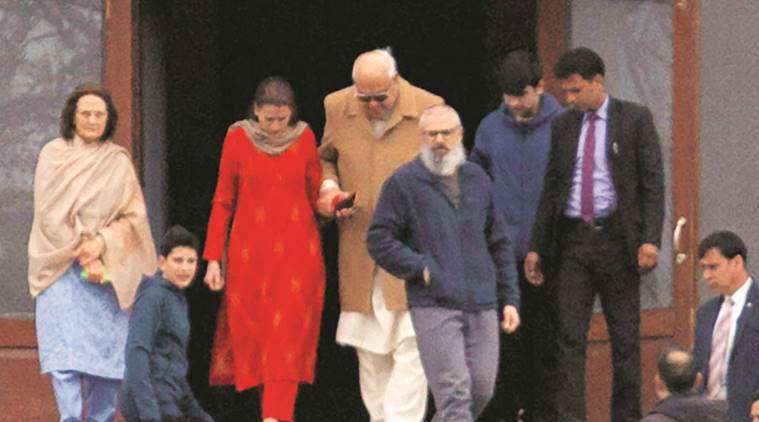 Farooq Abdullah and family visit Omar Abdullah at Hari Niwas, where the latter was kept under detention, in March this year. (ANI photo)
Farooq Abdullah and family visit Omar Abdullah at Hari Niwas, where the latter was kept under detention, in March this year. (ANI photo)
One is, of course, the 370 one and then a separate battle about the domicile change which we believe cannot stand legal scrutiny. That’s what we’ll do, I believe that’s the right way to do it. I believe this is the way that we will get justice.
When people ask me why don’t you demand that 370 be restored? Arrey bhai kisse demand karun? Jinhone liya unhin se main umeed karun ki woh wapas de denge. Again then, that’s fooling people. Ki aap ko khush karne ke liye main demand kar raha hun, ye jaante hue bhi ki demand karne se milna kuch nahin hai.
So I’m not going to do it, I’m sorry. If that disappoints you today, then I will live with your disappointment. But I would rather live with your disappointment today than your abuses tomorrow. I don’t want to mislead you about what I can and can’t do. And if that, today makes me somewhat suspect in your eyes, then that’s my misfortune. But I will take that today, rather than have you heap abuses on me tomorrow ki aapne dhokha diya.
How would you take the Gupkar declaration forward?
That’s a question for the participants. The NC hasn’t had a chance to take stock of its own status, much less the status of other political parties as part of that Gupkar declaration. What do the other participants in that meeting think, we don’t know. So, it would be wrong on my part to assume where other parties stand on it.
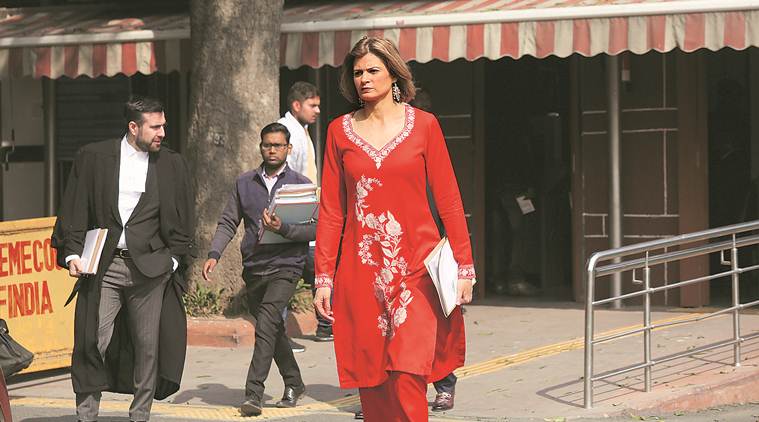 Sara Abdullah Pilot, sister of Omar Abdullah, outside Supreme Court in February this year. (Express photo by Tashi Tobgyal)
Sara Abdullah Pilot, sister of Omar Abdullah, outside Supreme Court in February this year. (Express photo by Tashi Tobgyal)
My detention was justified to parliament by quoting a fake news website. We made my continued detention untenable for the government. That’s the only way you get out here. That’s what Sagar sahab did. They took as long as they could, delaying it but you can’t delay what is inevitable. Detention orders of the nature that Sagar sahab and I had, are indefensible, which is why we are out. You have to force this government’s hand. And that’s why we have gone to court now for my colleagues under house detention. Because if you wait for the goodwill and mercy of this government, you will be in forever.
Do you see any correlation between what happened on August 5 and what is happening on the LAC in Ladakh?
I am no expert on this but there are people who have drawn this correlation. If I’m not mistaken, there have been voices from China that have said as much. That some of the statements from China post 5th August are what has resulted in the LAC actions of the Chinese Army. So, I have no reason to agree or disagree with them. Except to say that our relations with our neighbours as a whole our pretty bad. China, Nepal, Sri Lanka, Bhutan seems to be a bit of hit and miss. It’s not the most comfortable situation.
There has been a charge that the Abdullahs practise dynastic politics. Leadership of the party has remained within the family. How do you respond to this criticism?
The internal workings of a political party are hardly relevant to the issue at hand. We aren’t the first political party closely identified to a particular family and we won’t be the last. If the basic members of the NC don’t have a problem with the leadership of the party and the party continues to fulfill the criteria for internal party elections, then why should anyone else object. Incidentally, other than the Left parties, show me one, the BJP included, that hasn’t rewarded dynastic politics.
There’s also this feeling in certain quarters that leaders of political parties of the erstwhile state were opposed to any change in the status quo since it affected them the most, because it upset their apple cart.
You mean the quarters that were fed this line by the ruling party and its troll troupe tasked with manufacturing outrage? Can someone please show me how Article 370/35-A benefited only select families? If the status quo benefited only leaders of political parties, then why are people from Jammu to Leh screaming for the protection that the status quo afforded their education, their jobs and their land ownership?
There should be no demands for domicile law protections and no fears about demographic change if the status quo was only about a handful of families. The status quo, as you call it, was a commitment made with every single state subject of erstwhile J&K state and not just with a few individuals.
How have the events of August 5 changed your politics?
Of course, the most immediate one is my decision not to contest Assembly elections. I think, my politics is lot more angry and resentful than it was, and less trusting. That’s a scar I will always carry now. I was a lot more willing to take somebody at face value, I will not do that anymore. I don’t trust and I think that’s a really sad thing because I was never this bitter, untrusting person that I have become. I’m angry, hurt and distrustful now of what is said to me. And I don’t like that.
What gives you hope? What hope do you give to people when you talk to them now, going forward?
It’s not so much a hope but a belief that we can take this fight to its logical conclusion. I don’t want to sound like a happy, hopeful person because I’m not at that stage yet. I just have this belief and this commitment to myself that we will take this fight to its logical conclusion and that’s it.
I don’t want to cloak that in a garb of hopefulness because that comes from a place of optimism. I’m not in that place right now. I used to be cautiously optimistic. Now, I’m bordering between pessimism and realism. Which is not a good place for a politician because you’re supposed to take this message of eternal optimism. Maybe I’ll develop one. I think a lot of this feeling is because I haven’t had a chance to sit with fellow sufferers, workers in various parts of the valley and just vent, just talk. I think that catharsis that is necessary, that churning, that hasn’t happened. It will, and may be that will bring us to a better place, a more hopeful place. We’ll see.
Are you going to vote at some point?
If I believe in the processes of democracy and in the courts as a recourse to justice, then I also have to believe in the institutions that give the courts those powers through laws. So yes, I’m a mainstream political operative. Not only will I vote, but I will also hope that my party is able to galvanise people to vote. I just won’t be voting for myself for a while.
Courtesy: Indian Express




